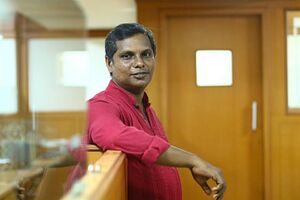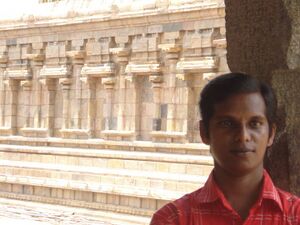Ilango Krishnan
இந்தப் பக்கத்தை தமிழில் வாசிக்க: இளங்கோ கிருஷ்ணன் Ilango Krishnan (born March 15, 1979) is a poet in Tamil and writes Modern poems. Ilango Krishnan writes poems with Metaphors and Musicality. He is also known as a critic and for his discussions on aesthetic principles of poetry.
Birth, Education
Ilango Krishnan was born on March 15, 1979 in Coimbatore to the couple of Balakrishnan and Saraswati.
Ilango Krishnan completed his primary education at CSI Primary school, Pappanayakkan Palayam, Coimbatore and higher education at R.K. Sreerangammal Kalvi Nilayam, Coimbatore. Ilango Krishnan completed his higher education in Corporation Men's Higher Secondary School, Ramanathapuram, Coimbatore. He studied Chartered Accountancy at CA Foundation and Inter ICAI in Coimbatore. He also completed Bachelor of Commerce through postal education in Annamalai University.
Personal Life
Ilango Krishna's wife's name was Yuvarani. They got married on on November 02, 2011 and have a daughter named Layasree (2012).
Ilango Krishnan worked as an assistant in the office of the Chartered Accountant. Now he has been working as a journalist.
Movie Industry
Ilango Krishnan is making his debut as a songwriter in the upcoming film Ponniyin Selvan directed by by Mani Ratnam.
Political Views
Ilango Krishnan is one of the poets who writes about poems related to politics. When talking about his thought process "Even though I am interested in Dialectical Materialism, I believe in allowing Idealistic views to an extent, which will help with my philosophical thought process. In politics it an be called Liberal Left Democratic View". Ilango Krishnan also says his political views are influenced by Kovai Gnani.
Literary Life
Ilango Krishnan started writing poetry during his college days. His poems from 2003 to 2005 were published in 2007 as Kayasandigai. He says his poems are influenced by C. Subramania Bharathiar, Athmanaam, Manushya Puthiran and fictional thinking


